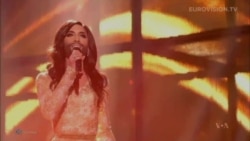LONDON —
The outcome of Sunday's Eurovision Song Contest is causing a backlash in Russia and escalating tensions with Europe that were already high over the crisis in Ukraine. The annual song contest is watched by an estimated 180 million people across 45 countries and this year's winner, from Austria, has provoked strong reactions.
'Rise Like A Phoenix’ by singer Conchita Wurst - a performance that won Austria the Eurovision Song Contest crown Sunday, after it received more votes than the 25 other finalists.
It’s the performer’s appearance that got the headlines. Conchita is a man dressed as a woman with long hair and a full beard.
Wurst called it a victory for European values.
"It was a victory not just for me, but also for those people who believe in a future that functions without discrimination and which is based on tolerance and respect," said Wurst.
Those words were widely seen as a swipe at Russia. Last year, the Russian government introduced laws against what it called ‘homosexual propaganda’.
In Moscow, there was widespread incredulity at Conchita Wurst’s Eurovision victory.
"The result was 'unbelievably awful.' It shows how much the cult of homosexuality is flourishing in Europe. This was just a horrifying event and God forbid that it comes here," said Russian student Alexander Sergeyev.
Russia came in seventh in the competition but its performers were booed by large sections of the crowd. The Russian judges awarded all their votes to former Soviet states.
In Stockholm, Eurovision partygoers like Ras Andrea praised the judges and the winning act.
“They did a great representation of their country, and obviously as a political stance making their song and the singer a very key figure in the political climate that we have today in Europe. So definitely yes, the right song did win," said Andrea.
That political climate has become more hostile. Russia's takeover of Crimea from Ukraine in March has been strongly condemned by Europe and the West, which also blame Moscow for the current unrest in eastern Ukraine. The Kremlin denies involvement.
When Russian conductor Valery Gergiev - a high profile supporter of President Putin’s actions in Ukraine - staged a concert in London Sunday, around 30 anti-Putin protestors staged a short demonstration as Gergiev took to the stage. Among them was human rights activist Peter Tatchell.
“We thought it was very important to challenge Valery Gergiev over his support for President Putin; his endorsement of Russia’s anti-gay law; and his approval of Russia’s actions in Ukraine. For him to be able to perform unchallenged would have been very wrong," said Tatchell.
Although it appears Russia is facing the beginnings of a cultural backlash in Europe, there was one surprising result: both Russia and Ukraine voted for each other in the Eurovision song contest.
'Rise Like A Phoenix’ by singer Conchita Wurst - a performance that won Austria the Eurovision Song Contest crown Sunday, after it received more votes than the 25 other finalists.
It’s the performer’s appearance that got the headlines. Conchita is a man dressed as a woman with long hair and a full beard.
Wurst called it a victory for European values.
"It was a victory not just for me, but also for those people who believe in a future that functions without discrimination and which is based on tolerance and respect," said Wurst.
Those words were widely seen as a swipe at Russia. Last year, the Russian government introduced laws against what it called ‘homosexual propaganda’.
In Moscow, there was widespread incredulity at Conchita Wurst’s Eurovision victory.
"The result was 'unbelievably awful.' It shows how much the cult of homosexuality is flourishing in Europe. This was just a horrifying event and God forbid that it comes here," said Russian student Alexander Sergeyev.
Russia came in seventh in the competition but its performers were booed by large sections of the crowd. The Russian judges awarded all their votes to former Soviet states.
In Stockholm, Eurovision partygoers like Ras Andrea praised the judges and the winning act.
“They did a great representation of their country, and obviously as a political stance making their song and the singer a very key figure in the political climate that we have today in Europe. So definitely yes, the right song did win," said Andrea.
That political climate has become more hostile. Russia's takeover of Crimea from Ukraine in March has been strongly condemned by Europe and the West, which also blame Moscow for the current unrest in eastern Ukraine. The Kremlin denies involvement.
When Russian conductor Valery Gergiev - a high profile supporter of President Putin’s actions in Ukraine - staged a concert in London Sunday, around 30 anti-Putin protestors staged a short demonstration as Gergiev took to the stage. Among them was human rights activist Peter Tatchell.
“We thought it was very important to challenge Valery Gergiev over his support for President Putin; his endorsement of Russia’s anti-gay law; and his approval of Russia’s actions in Ukraine. For him to be able to perform unchallenged would have been very wrong," said Tatchell.
Although it appears Russia is facing the beginnings of a cultural backlash in Europe, there was one surprising result: both Russia and Ukraine voted for each other in the Eurovision song contest.





